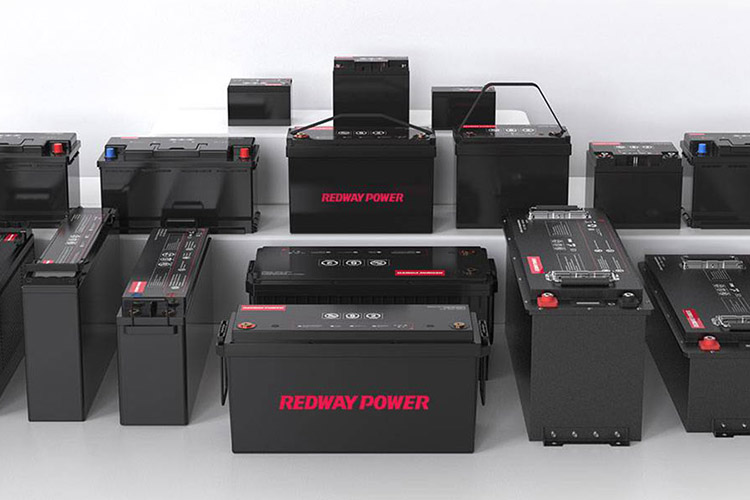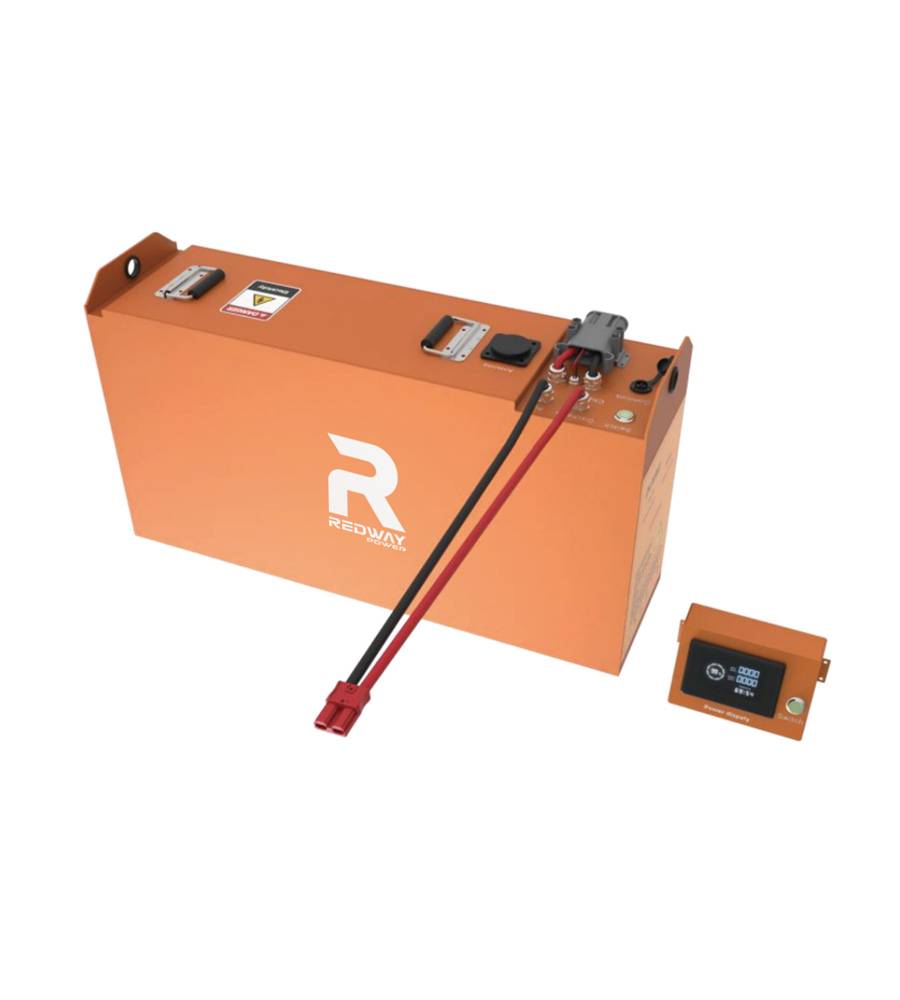-
Home
- About Liduo
- Product Center
- RV lithium battery
- Forklift lithium battery
- Wall mounted lithium battery
- Golf cart lithium battery
- Server rack battery
- lithium iron phosphate battery
- Solution
-
Portable battery
-
Power battery
-
Energy storage battery
-
Server battery
-
Special batteries
-
Household energy storage
- OEM Services
- R&D
- News

 PRODUCT CENTERClassify
PRODUCT CENTERClassify51.2V 48V 300Ah 304h Forklift Lithium Battery
- Type:48V
- Code:

-
Lithium battery Lithium iron phosphate (LFP)
Rated voltage 51.2V
Nominal capacity 304Ah
Nominal energy 15.56KWh
Dimensions (L * W * H) 940 x 260 x 520 mm
Weight 164 kg
IP level IP65
- Product Description
The 51.2V 300Ah Forklift Lithium Battery offers an impressive 15.56kWh energy output, ideal for demanding industrial applications. Designed with LiFePO4 technology, this durable battery ensures long-lasting performance with over 4000 cycles. Perfect for OEM/ODM and wholesale buyers, it features high discharge capabilities, efficient cooling, and smart monitoring for operational reliability.

Key Features
· Powerful Capacity: 51.2V, 300Ah for up to 15.56kWh of energy.
· Long Lifespan: Over 4000 charge cycles (80% DOD), ideal for long-term use.
· Robust Discharge Performance: 300A continuous, with 600A peak discharge for high-demand applications.
· Durable & Weatherproof: IP65 rating and natural cooling for all-weather performance.
· Advanced Battery Management: Features smart BMS, 4G connectivity, and real-time monitoring.
Product Description
The 51.2V 300Ah Forklift Lithium Battery is engineered for heavy-duty industrial use, providing 15.56kWh of energy in a compact and durable package. With a metal shell and IP65 rating, it is fully protected against dust and water, ensuring reliability in challenging environments. The battery supports natural cooling, making it energy-efficient and minimizing maintenance needs.

Wholesale lithium golf cart batteries with 10-year life? Check here.
Built with LiFePO4 lithium cells, this forklift battery is designed for long-term use, offering over 4000 charge cycles at 80% depth of discharge (DOD). It is perfect for OEM/ODM and wholesale buyers seeking customized solutions for industrial applications. The battery features advanced BMS protection that ensures operational safety by continuously monitoring parameters like voltage, current, and temperature.
With a max continuous discharge current of 300A and a peak discharge current of 600A for up to 5 seconds, this forklift battery handles high-power demands. Its RS485, CAN-bus, and 4G communication system allows for real-time monitoring, making it easier to track battery health and performance.
Whether you’re looking for efficient, long-lasting energy for your fleet or customized OEM/ODM battery solutions, this 51.2V 300Ah forklift lithium battery is an optimal choice. It comes with a 5-year warranty, giving you peace of mind and ensuring that your operations are powered by cutting-edge lithium technology.
Specifications Lithium Cell Type LiFePO4 Nominal Voltage 51.2V Nominal Capacity 304Ah Nominal Energy 15.56kWh Dimensions (L*W*H) 940 x 260 x 520 mm Weight ~164 kg Max Charge Current 150A (Continuous) Max Discharge Current 300A (Continuous) Peak Discharge Current 600A (5s) Operating Voltage Range 40V–58.4V IP Rating IP65 Cooling Natural Cooling Cycle Life >4000 cycles (DOD 80%) Charge Temperature 0℃ – 55℃ Discharge Temperature -20℃ – 60℃ Battery Shell Metal Communication RS485, CAN-bus, 4G Warranty 5 years BMS Protection Advanced smart BMS monitoring SOC, system voltage, current, cell voltage, cell temperature, overcharge, overdischarge, overcurrent, overvoltage, low-voltage, overtemperature, short circuit, etc. 51.2V Lithium Forklift Battery Performance
What is the capacity range of 51.2V forklift batteries?
51.2V forklift lithium batteries typically range from 100Ah to 800Ah, with common capacities being 200Ah, 300Ah, and 400Ah. Higher-capacity models (500Ah-800Ah) are used for heavy-duty applications, providing extended runtime for multi-shift operations in warehouses and logistics centers.How does 51.2V lithium battery improve forklift efficiency?
51.2V lithium batteries charge 3x faster (1-2 hours vs. 8+ for lead-acid), provide consistent voltage output, and enable opportunity charging during breaks. They’re 30-50% lighter, increasing payload capacity, and maintain performance in extreme temperatures, reducing downtime in demanding environments.Are China factory batteries certified for global standards?
Yes, reputable Chinese manufacturers comply with UL 1973, CE, UN38.3, RoHS, and ISO 9001 standards. Many also meet IEC 62619 and GB/T (China national standards), ensuring safety, performance, and international market compatibility. Always request certification documents before bulk purchases.What is the lifespan of wholesale forklift lithium batteries?
Quality 51.2V lithium batteries last 8-10 years (or 3,000-5,000 cycles) at 80% depth of discharge—5x longer than lead-acid. Proper usage (avoiding full discharges) and temperature control can extend lifespan further, reducing long-term replacement costs.How to maintain 51.2V lithium batteries in industrial environments?
- No watering or equalizing needed
- Store at 30-50% charge if unused
- Keep terminals clean and dry
- Avoid deep discharges below 20%
- Perform annual capacity checks
Built-in BMS handles most protection automatically.
What safety features do China-made forklift batteries include?
- Smart BMS (overcharge/discharge protection)
- Thermal management (prevents overheating)
- Short-circuit & spark-proof design
- IP54+ waterproofing (dust/moisture resistance)
- Flame-retardant casing (LiFePO4 chemistry is inherently safer)
These features meet strict international safety requirements for industrial use.
48V 300Ah Lithium Battery Guide
What is the voltage and capacity of the battery?
The voltage for lithium forklift batteries is commonly 48V, with capacities typically ranging from 150Ah to 500Ah. For example, a 48V 300Ah battery offers an optimal balance between energy storage and operational efficiency, suited for medium to heavy-duty forklift operations.Why choose lithium for industrial forklifts?
Lithium forklift batteries offer longer lifespan, faster charging, zero maintenance, and higher energy efficiency. They provide consistent power, reduce downtime, and are more environmentally friendly than traditional batteries, making them ideal for modern warehouse operations.Advantages over lead-acid batteries for forklifts?
Lithium batteries outperform lead-acid by offering longer lifespan, faster charging, and zero maintenance. They also operate more efficiently, with no risk of sulfation and are lighter, reducing energy consumption and improving overall productivity in forklifts.Maintenance requirements for 48V 300Ah lithium battery?
Lithium forklift batteries require minimal maintenance. Regular checks involve monitoring the Battery Management System (BMS), ensuring proper temperature regulation, and inspecting terminals for corrosion. No need for watering or equalization charges, unlike lead-acid alternatives.Safety features in lithium forklift batteries?
Lithium forklift batteries have overcharge, over-discharge, and short-circuit protection built into the Battery Management System (BMS). They are also equipped with thermal management to prevent overheating and fire-resistant casing for added safety in high-demand environments.Cost-benefit analysis of lithium vs traditional batteries?
Lithium batteries have a higher upfront cost but provide significant savings over time due to longer lifespan (3-5 times longer), faster charging, and no maintenance. In contrast, lead-acid batteries require more frequent replacements and have higher long-term operational costs, making lithium a more cost-effective option in the long run.304Ah Lithium Battery for Forklifts
What is the lifespan of 304Ah lithium battery for forklifts?
304Ah lithium batteries typically last 8-10 years or 3,500-5,000 cycles at 80% depth of discharge (DoD) – 5x longer than lead-acid batteries. With proper care, they maintain 80%+ capacity throughout their lifespan, making them ideal for intensive multi-shift operations.How does 304Ah battery compare to lead-acid alternatives?
Compared to lead-acid:
✓ 5x longer lifespan (3,500+ vs 700 cycles)
✓ 3x faster charging (2h vs 8h+)
✓ 50% lighter weight
✓ Zero maintenance (no watering/equalizing)
✓ 30% more energy efficient
✓ Safer (no acid leaks/explosion risks)What electric forklift models support 304Ah batteries?
304Ah batteries power 3-5 ton forklifts including:
• Toyota Traigo 80
• Hyster H2.5-3.5XT
• CAT EP25-30K
• Linde E20-E35
They're also compatible with heavy-duty reach trucks and container handlers requiring extended runtime.Are there specific maintenance requirements for 304Ah batteries?
No regular maintenance needed – just:- Keep terminals clean
- Avoid deep discharges (<20%)
- Store at 30-50% charge if unused
- Annual capacity check recommended
Built-in BMS automates all protection.
What are the cost benefits of 304Ah lithium batteries?
Despite higher upfront cost, 304Ah lithium offers:
• 60% lower TCO over 10 years
• No maintenance costs
• 30% energy savings
• Zero replacement for 8+ years
• Increased productivity from fast chargingHow does temperature affect 304Ah battery performance?
• Optimal range: 0°C to 45°C
• Operational range: -20°C to 60°C
• Cold weather: Reduced capacity (temporarily)
• Hot weather: Accelerated aging if >45°C
Built-in BMS with thermal management protects against extremes.300Ah Lithium Forklift Battery Market
Benefits of 300Ah lithium forklift batteries?
A 300Ah lithium forklift battery offers extended operational time, faster charging, and zero maintenance. It provides consistent, high-efficiency power for demanding operations, has a longer lifespan, and eliminates the need for watering and equalization, making it a cost-effective solution in the long run.Certifications for lithium forklift battery suppliers?
Reliable lithium forklift battery suppliers hold certifications such as UL 2580, CE, UN38.3, IEC 62619, and ISO 9001. These certifications ensure that the batteries meet global safety, quality, and performance standards, making them suitable for industrial applications.Maintenance requirements for 300Ah lithium batteries?
300Ah lithium forklift batteries require minimal maintenance. Regular checks involve ensuring proper battery management system (BMS) functionality, monitoring temperature control, and inspecting terminals. Unlike lead-acid, they do not require watering or equalization charging, reducing downtime and maintenance costs.Cost comparison: lithium vs lead-acid forklift batteries?
Lithium batteries have a higher upfront cost but last 3-5 times longer and require less maintenance compared to lead-acid batteries. In the long run, lithium batteries offer greater cost savings due to longer lifespan, faster charging, and lower operational and maintenance costs.Charging time for high-capacity lithium forklift batteries?
High-capacity 300Ah lithium forklift batteries typically charge in 2-4 hours with a fast charger. This is much quicker than lead-acid alternatives, which can take 8-10 hours to fully charge, reducing forklift downtime and increasing operational efficiency.Industries using 300Ah lithium forklift batteries?
Industries like warehousing, logistics, manufacturing, and distribution commonly use 300Ah lithium forklift batteries. These batteries are ideal for environments requiring high uptime and efficiency, such as automotive, retail, food processing, and e-commerce warehouses.Dual Voltage Forklift Batteries
What are the advantages of dual voltage forklift batteries?
Dual voltage (48V/51.2V) lithium batteries offer backward compatibility with existing forklifts while enabling higher efficiency in modern models. They provide flexibility across equipment, reduce inventory needs, and deliver optimized performance for both old and new systems.How does 51.2V/48V enhance forklift performance?
51.2V systems improve energy efficiency (5-10% more runtime vs. 48V) and power output, while maintaining compatibility with 48V forklifts. The higher voltage reduces energy loss, supports fast charging, and enhances motor performance in heavy-duty applications.Are lithium forklift batteries safer than lead-acid?
Yes, lithium batteries (especially LiFePO4) are non-explosive, leak-proof, and maintenance-free. They feature built-in BMS for overcharge/discharge protection, no toxic fumes, and better thermal stability than lead-acid, making them safer for indoor use.What is the charging time for 51.2V lithium forklift batteries?
51.2V lithium batteries charge in 1-2 hours (vs. 8+ for lead-acid), with some supporting opportunity charging (partial top-ups). Fast charging reduces downtime, enabling 24/7 operations in high-demand environments.Which forklift models support dual voltage lithium batteries?
Compatible models include:
• Toyota Traigo 48V/51.2V series
• Hyster H2.0-3.5XT
• CAT EP20-30K
• Linde E20-E35
Many modern electric forklifts accept both voltages.How to maintain a 48V lithium battery for forklifts?
• No watering/equalizing needed
• Store at 30-50% charge if unused
• Keep terminals clean & dry
• Avoid deep discharges (<20%)
• Perform annual capacity checks
Built-in BMS handles most protections automatically.China Lithium Forklift Battery Manufacturers
What certifications do Chinese manufacturers hold?
Chinese manufacturers of lithium-ion forklift batteries typically hold certifications such as ISO 9001, CE, UL 2580, UN38.3, and IEC 62619. These certifications ensure the safety, quality, and reliability of the batteries, making them compliant with global industry standards.Advantages of lithium-ion forklift batteries?
Lithium-ion forklift batteries offer longer lifespan, faster charging, and higher energy efficiency compared to traditional lead-acid batteries. They require zero maintenance, provide consistent power output, and reduce downtime, making them ideal for high-demand industrial applications.How do pricing factors compare globally?
Pricing of lithium-ion forklift batteries varies based on production scale, battery capacity, and raw material costs. While Chinese manufacturers often offer more competitive pricing due to large-scale production, other factors like shipping, certification requirements, and import duties can affect pricing in different regions.Custom battery solutions available for forklifts?
Yes, Chinese manufacturers offer custom lithium-ion battery solutions for forklifts, including adjustments to voltage, capacity, and size to fit specific operational needs. These custom solutions often include tailored Battery Management Systems (BMS) and personalized configurations to meet industry-specific requirements.What warranty policies are typically offered?
Warranty policies for lithium-ion forklift batteries typically range from 3 to 5 years, with many manufacturers offering 5,000 to 7,000 cycles or a certain capacity retention percentage (usually 80%). Some suppliers also provide extended warranties based on the size of the order and the specific application.Key industries using these batteries in China?
Industries in warehousing, logistics, manufacturing, and automotive often use lithium-ion forklift batteries in China. Other key sectors include e-commerce, food processing, and retail, where the need for efficient, high-performance material handling is critical.
-
About Us
Company Profile History Organizational Honor -
Product Center
Forklift lithium battery Rv lithium battery Wall-mounted lithium battery Golf cart lithium battery -
Solution
Energy storage battery Power battery Server battery -
Know us
News center Contact us -
Contact us
0769-89333805 No. 78, Puxing East Road, Qingxi Town, Dongguan City mg@redwaycn.com
Copyright 2025 Dongguan Liduowei new energy Co., LTDTechnical support:Emore - About Liduo


